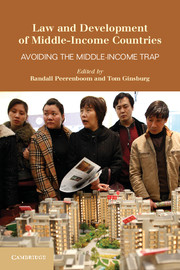Book contents
- Frontmatter
- Contents
- List of Contributors
- Acknowledgments
- 1 Law and Development in Middle-Income Countries
- Part I The Politics of Development in Middle-Income Countries
- Part II Middle-Income Countries in a Globalized Economy
- 4 The Rise of Middle-Income Countries in the International Trading System
- 5 The Middle Intellectual Property Powers
- 6 Growing Wealth in East Asian Middle-Income Countries with Transnational Production Regimes
- Part III Good Governance and the Rule of Law in Middle-Income Countries
- Part IV Socioeconomic Challenges in Middle-Income Countries
- Part V International Donor Strategies for Middle-Income Countries
- Appendix Selected Country Data as of 2011
- Index
- References
4 - The Rise of Middle-Income Countries in the International Trading System
Published online by Cambridge University Press: 05 June 2014
- Frontmatter
- Contents
- List of Contributors
- Acknowledgments
- 1 Law and Development in Middle-Income Countries
- Part I The Politics of Development in Middle-Income Countries
- Part II Middle-Income Countries in a Globalized Economy
- 4 The Rise of Middle-Income Countries in the International Trading System
- 5 The Middle Intellectual Property Powers
- 6 Growing Wealth in East Asian Middle-Income Countries with Transnational Production Regimes
- Part III Good Governance and the Rule of Law in Middle-Income Countries
- Part IV Socioeconomic Challenges in Middle-Income Countries
- Part V International Donor Strategies for Middle-Income Countries
- Appendix Selected Country Data as of 2011
- Index
- References
Summary
With the collapse of the Doha Round in December 2011, and the rise of middle-income countries (MICs) in the global economy, it is an opportune time to assess the place, role, and strategies of the MICs in the international trading system. Over the past twenty years, there has been a shift in relative global economic influence, one that has become more salient since the financial crisis besetting the United States and Europe in 2008. This chapter assesses how MICs have engaged with the international trading system over time, what strategies they advance, and what are the implications for going forward, focusing on the negotiation and enforcement of the rules of the World Trade Organization (WTO). A central goal of MICs is to transform themselves into high-income countries (HICs) and to use trade policy as a tool for doing so.
Scholars of various persuasions have found that the WTO system has been structured to benefit the interests of the United States and Europe. Yet MICs, and the larger MICs in particular, have learned to adapt to the legalized system of trade relations and become more adept in using it to advance their interests, whether to open foreign markets or to defend domestic policy. They also have increased their bargaining leverage, which has made trade negotiations more difficult given their differentiated trading interests, and in particular their demands for “policy space” for a greater role of the state in economic development. By policy space, we refer to the ability of a government to intervene to support particular economic development policies, whether through state-owned enterprises or government support of infant industries and particular strategic sectors. In many ways, the collapse of the Doha Round can be explained by the rise of the MICs in light of their distinct interests, their increased ability to advance them, and their increased rivalry with, and relevance to, HICs, which have correspondingly, but so far unsuccessfully, demanded additional concessions from them.
- Type
- Chapter
- Information
- Law and Development of Middle-Income CountriesAvoiding the Middle-Income Trap, pp. 59 - 83Publisher: Cambridge University PressPrint publication year: 2014
References
- 1
- Cited by



